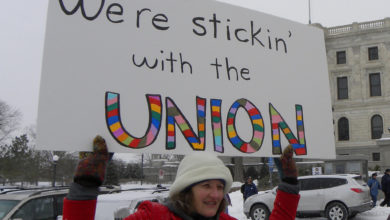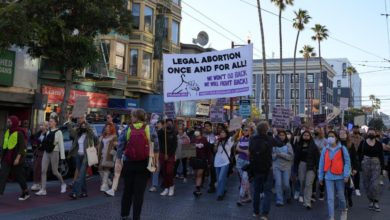This Supreme Court decision will rank with the Dred Scott decision, so thoroughly mistaken as to be a landmark.
—George E. Ehrlich, M.D., in an April 19 letter to the New York Times.
Just hours after the Supreme Court’s ruling to uphold the constitutionality of a federal law banning a rarely used second trimester abortion procedure, a legislator in Alabama introduced a bill that would ban almost all abortions in that state.
Other states including North Dakota, Missouri, Georgia, South Carolina and Texas may also become battlefields in the
 |
The Gonzalez v. Carhart decision represents a new legal strategy on the part of the right-wing, anti-choice movement: to shift away from attempting to ban abortion altogether with a constitutional amendment and instead use an “incrementalist” approach. This means chipping away at different procedures.
This approach is no less insidious than seeking an outright ban on abortion. The effect is to place unfair burdens on women seeking abortion. Such burdens include forcing women to look at an ultra-sound photo of the fetus, or read or hear graphic descriptions of the abortion procedure.
Other bills being considered are somewhat more symbolic. Legislators in North Dakota are considering a bill that would immediately ban abortion statewide if Roe v. Wade is overturned. The Mississippi legislature passed such a bill earlier this year, banning nearly all abortions if the ruling is overturned. The law was signed on April 19 by Gov. Haley Barbour, a Republican.
On the other hand, the anti-choice movement has faced some setbacks recently as well.
In Oklahoma, Gov. Brad Henry vetoed legislation on April 18 that would ban state facilities and workers from performing abortions except to save the life of the pregnant woman.
Henry has supported restrictions on abortion in the past, but he said the recent bill went too far. Last month, Gov. Dave Freudenthal of Wyoming vetoed a bill that would have created a new category of homicide if a pregnant woman was murdered and her unborn fetus died.
And, on Thursday, after the Carhart decision, Gov. Eliot Spitzer of New York told an abortion rights group that he would work to keep abortion legal in his state. Last year, legislators in South Dakota passed a ban on almost all abortions in that state, but the measure was repealed by voters after being placed on the ballot as a referendum.
The Democratic politicians who are “fighting” to protect the right to choose are not simply acting on their consciences. They know that the vast majority of women and men in this country support a woman’s fundamental right to choose to control her body, including access to safe and legal abortion in order to terminate an unwanted pregnancy. Such access is integral for women’s equal participation in all aspects of society.
Women cannot allow the pro-choice movement to become derailed into a movement to elect more Democrats at the state or federal level. The defeat of an anti-choice law in South Dakota by a referendum vote shows the power of a more grassroots approach.
What is needed now is a massive outpouring of a militant pro-choice majority, a demonstration of our strength in the face of this viciously reactionary ruling.
Click here to read more on the Supreme Court decision from the PSL.





